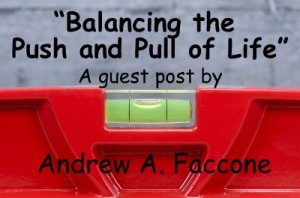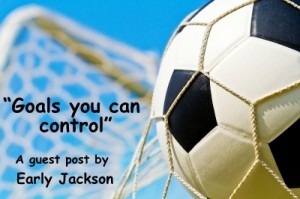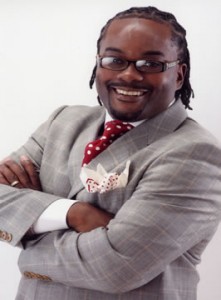Balancing the Push and Pull of Life
In today’s guest post Andrew A. Faccone draws upon his own life experiences and his coaching expertise to share 3 points around life, commitment and time.
[pinit float=”right”]

Balancing the Push and Pull of Life ..
“Life is like riding a bicycle. To keep your balance you must keep moving.”
(Albert Einstein)
We are all given 24 hours a day, 1,440 minutes per day and 86,400 seconds per day to use how we see fit.
Those of us reading this post are very fortunate and blessed to choose how we are to use that precious time we are given. That allotted time has a short life span, it must be used immediately and it cannot be carried over. If it is not used properly it expires.
It is our choice to maximize or minimize how we allocate our days, weeks, months and years that we are given in our lifetime. The mystery of life reveals that life is not a straight line, there is no instruction booklet on how to live and we are responsible for our actions.
The attention that we pay to the little things throughout life has a dramatic effect on the outcomes of our life as we progress and mature throughout our lifetime. Since our birth we have all pursued different paths, we have learned, prospered, been knocked down and despite the challenging conditions have succeeded as well as failed in some of our endeavors. The challenges have made us stronger and the shortcomings have taught us what not to repeat in the future. In some cases we are all learning from those shortcomings.
Past events somehow always re-appear at various times throughout our lives. In the time of our youth we pursued our education and the playful desires of our youth. Academics, athletics, music, literature, sciences, religious education, play time with our childhood friends, youth and civic groups, participation with a strong supervision from our families who attended those important life events. They cheered us on in victory and comforted us when the results did not materialize as hoped for.
When our formal education ended we then used our educational backgrounds or God given talents to find a way to make a go of it on our own. Welcome to being a grown up! We now face the commitments of professional life, parenthood, earning a living, providing for our families, advancing our professional careers and now we have become those attendees routing for our family members as they progress through their childhood and young adult activities that we participated in in the not so distant past.
Where is the person who wanted to change the world and make the difference in the world?
Is this life still a life in balance? Is there equal push and pull in our daily activities? Finding that balance, the constant struggle that addresses all of the aspects of our lives. Spirituality, physicality, and mentality.
I am asked many times in all of my personal & professional travels how did I get where I am in life? I have some of the answers to this question and some answers I do not have. I have been blessed to have had some extraordinary people that have been a part of my life. Nine years of a disciplined Catholic school education, athletic participation in high school and college, a loving family along with several key family members who taught me about the true lessons of life and that I can do anything that I set myself to attaining.
I try to rely on 3 key points and try to use them as my daily guide as I try to find a balance between the many commitments I am involved with in my daily life both personally and professionally.
What you say will determine what you will become. I have always been a believer in word affirmations. The words you are projecting will impact your individual outcomes. If you’re not projecting positive words and expecting great things to occur, they will not happen. If you don’t believe something will happen nobody else will. Use those empowering words to get you to where you want to be.
- Control The Controllables is the most important piece of our lives’ direction. We cannot control other people or the actions that they undertake, outside events, or decide the specific outcomes for certain situations. We can only control ourselves and our actions; we are accountable to those actions and decisions that we ourselves make. No one else. Do the best you can to work on those goals both short term and long term, work diligently and constantly change your approach to achieve your goals, but understand you can only control what is in front of you. A strong will can conquer anything, but you also have to be realistic in what you undertake.
- Have a goal & the end point in mind. We all set out many times to undertake certain projects but never have the end goal in mind. Example: I am going on a diet and lose weight. That statement screams starve yourself and constantly not be satisfied with even losing the smallest amount of weight. Give yourself credit for wanting to lose weight and changing your eating habits. Whenever a new habit is introduced to our lives it takes roughly 28 days to form a new habit. You have to give yourself credit and realize that to be successful and create a new habit it takes time. Having the end point in mind, losing 1-2 pounds weekly and trying to exercise on a more regular basis is a realistic goal & plan. It is not where you are it’s the direction that you are headed that counts. Keep that goal of where you want to be ever present in your daily actions. You’ll be surprised what you can attain.
- Enjoy the journey Life is full of surprises, challenges, and lot of unexpected “things “occur. When life throws the unexpected curve at us daily, which it does to us at some point, we need to readjust and get yourself back on track of the task at hand. Interruptions, issues, something totally unexpected is going to occur. Deal with it quickly and to the best of your ability and get back to what you were you were doing. Once that event has occurred put it in the rear view mirror and move on. Tony Robbins, noted author & motivational speaker, referenced the statement ‘the past does not equal the future’. It is so true. We all need to be aware of this statement and realize that we are doing the best that we can, with the time we have to enjoy each day with its many challenges and surprises.
Life is an attitude -have a good one and you will enjoy the wonderful journey. When you start to make these new adjustments in your daily activities, changes in those daily habits, week after week, month after month, and year after year you will start to recognize that new person in the mirror who you have not seen in some time. Start small but think big, because you can do it, great things are coming your way… it all depends on you!
About the Author/Further Resources
Andrew Faccone, MBA is employed in the healthcare industry as a long term care account specialists in the United States near the New York Metropolitan area. Andrew has over 18 years experience as an athlete,& coach positively impacting the lives of athletes he has coached. Andrew is available for speaking engagements of any size or location and individual coaching sessions.
Contact Andrew A. Faccone at aa****@***oo.com or
Linkedin : http://www.linkedin.com/pub/andrew-a-faccone-mba/24/291/3b2
Cell Phone 732 614 8425 Eastern Time Zone
Background on Image above title via: FreeDigitalPhotos.net

 Early L. Jackson Jr
Early L. Jackson Jr